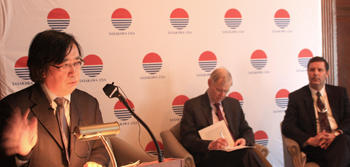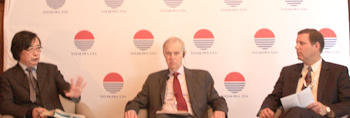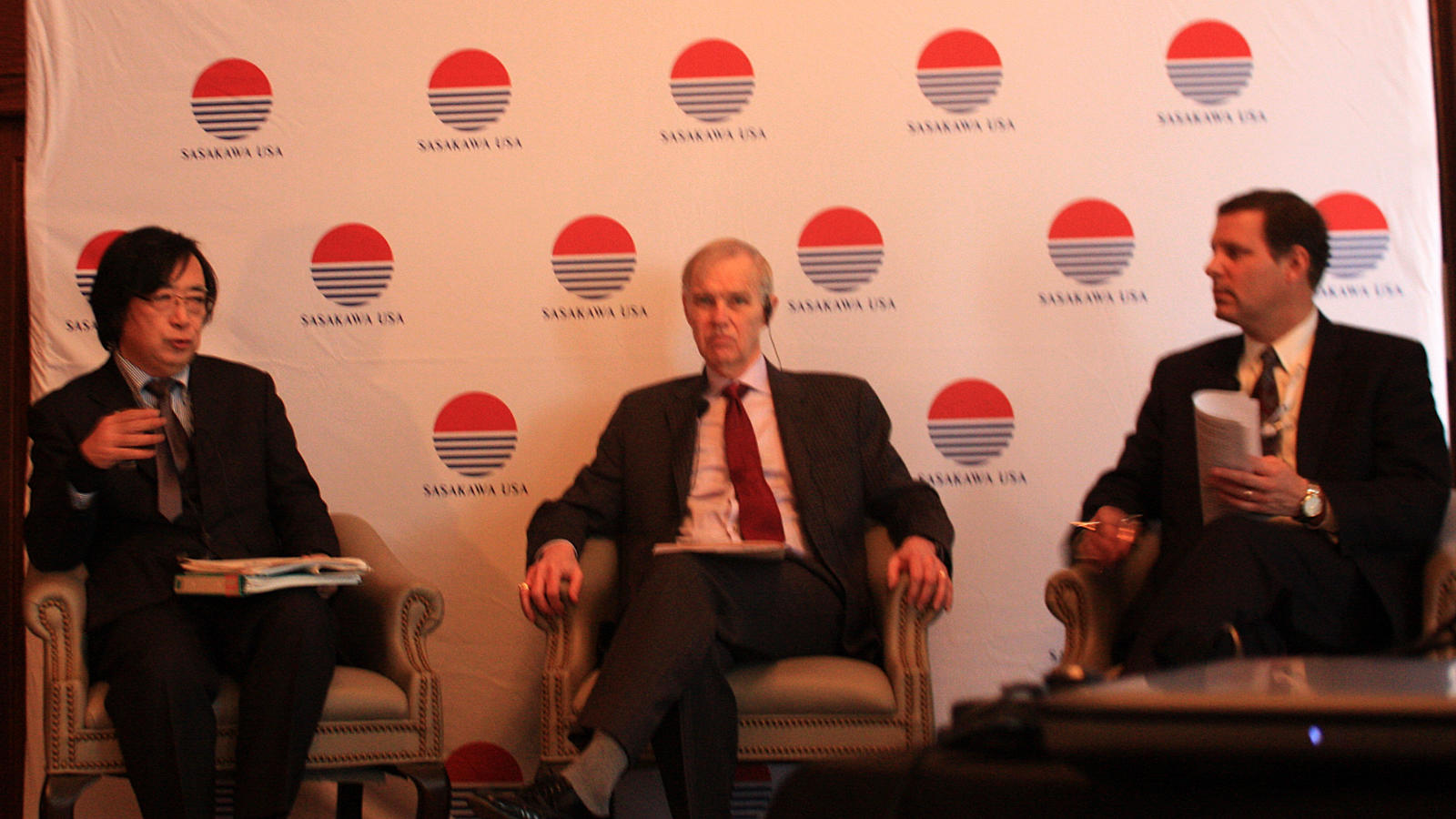 On the 11th of January, a conference jointly sponsored by Genron NPO and The Sasakawa Peace Foundation (SPF-USA) was held, with around 100 individuals in attendance. After Dennis Blair, the Chairman of the Board and CEO of SPF-USA, gave his opening remarks, President Yasushi Kudo began his speech as the main guest of the event.
On the 11th of January, a conference jointly sponsored by Genron NPO and The Sasakawa Peace Foundation (SPF-USA) was held, with around 100 individuals in attendance. After Dennis Blair, the Chairman of the Board and CEO of SPF-USA, gave his opening remarks, President Yasushi Kudo began his speech as the main guest of the event.
This address took place on the same day that the president-elect of the United States, Donald Trump, held his first press conference after winning the election. Kudo started off his speech with the significance and possibility of public diplomacy in a new era for Northeast Asia. He first introduced the results of three public opinion surveys (the Japan-China Public Opinion Poll, which has been carried out annually since 2005, and the Japan-South Korea Public Opinion Poll and the Japan-China-ROK Public Opinion Poll). Through analysis of the trends of public opinion in Northeast Asia, Kudo introduced some political challenges and prospects facing the region.
Kudo began by pointing out that Japan-China diplomatic relations had fallen apart for a total of 5 years in the last 12 years since the inception of the survey, and that public diplomacy filled the gap left by this rift. He explained the importance of channels for public dialogue, which play a big role in bringing stability to the Northeast Asian region.
While referring to the results of the opinion surveys, Kudo pointed out that there was a lower level of mutual understanding between the people of Japan, China, and South Korea than expected. He attributed this to an overwhelming lack of direct interaction between the citizens of each country, as well as an excessive reliance on media reports for information about other countries. On the other hand, Kudo also touched on the recent influx of Chinese tourists and workers in Japan. He explained that this trend has improved Chinese opinions on Japan, and could possibly lead to new developments in direct exchange and dialogue between the two countries.
Next, Kudo pointed out that the change in attitude and awareness among the peoples of Japan, China, and South Korea have been impacted by China's growing influence in Asia, as well as geopolitical friction between Japan-US and China. On top of that, Kudo brought up a few trends and changes that may require further attention, such as the fact that the pace of improvement in Japan-China intergovernmental relations and the feelings of citizens in each country are not in sync with each other. Furthermore, the fact that over 60% of people in China believe that there will be military conflict around the Senkaku islands in the future, and the presence of a heightened sense of anxiety regarding national security should also be taken into consideration. Kudo also cited the fact that over 80% of Chinese people polled think that Russia is a trustworthy ally as something to be aware of.
Furthermore, public opinion on Japanese-Korean relations, which had some initial improvement with the resolution of the comfort women agreement, is beginning to worsen progressively. Kudo indicated that the conflicted public perception of Japan-ROK relations is not only caused by a deep-seated stagnation regarding the resolution of historical issues, but also a lack of understanding of Japan's security policy in South Korea. Kudo also introduced statistical data that shows that more than 80% of South Koreans polled think of North Korea as a military threat, and almost 40% feel the same way about Japan. That is to say, 40% of South Koreans feel that there is a possibility of military conflict between ROK and Japan in the future. This reason behind this statistic was attributed to a piece of legislation that was passed last year, which introduced a new interpretation of the Japanese constitution that allows the country to exercise its right to collective self-defense. Kudo stated that this law, which was made to strengthen Japan's alliance with the United States, was accepted by military officials, but was not appreciated by South Korean citizens. This can also be understood as being related to historical issues between Japan and South Korea.
At the end of his speech, Kudo pointed out that with the expansion of Chinese and Russian influence, the relative decline of US presence, and the state of affairs in North Korea, we are in a climate of political instability without precedent. However, in the midst of this instability, there is hope to be found in the fact that about half of the Japanese, Chinese, and South Korean citizens surveyed expressed that "peace" is value that needs to be pursued for the future of East Asia. Kudo suggests that this positive response is a fragment of hope towards creating regional peace in Northeast Asia.
Kudo ended his speech by reaffirming The Genron NPO's role in making efforts towards the realization of peace in Northeast Asia. This will be done by encouraging a problem-solving initiative among the citizens, which will then become the foundation that sets intergovernmental diplomacy into motion.
 After the speech, James Schoff, the senior associate for Carnegie Endowment for International Peace, moderated a discussion between Kudo and Richard Bush, the director of Brookings Center for Northeast Asian Policy Studies. Both parties emphasized the importance of implementing non-governmental dialogue based on the enactment, analysis, and results of the public opinion polls conducted by The Genron NPO over the past decade. They also discussed other issues in the region. These include the significant impact that trends of public opinion in Japan, China, and ROK have on domestic and foreign governmental policy, the leanings and issues regarding media reports in each country, as well as concerns regarding Japan-South Korea collaboration vis-à-vis North Korea, which has not been making much progress.
After the speech, James Schoff, the senior associate for Carnegie Endowment for International Peace, moderated a discussion between Kudo and Richard Bush, the director of Brookings Center for Northeast Asian Policy Studies. Both parties emphasized the importance of implementing non-governmental dialogue based on the enactment, analysis, and results of the public opinion polls conducted by The Genron NPO over the past decade. They also discussed other issues in the region. These include the significant impact that trends of public opinion in Japan, China, and ROK have on domestic and foreign governmental policy, the leanings and issues regarding media reports in each country, as well as concerns regarding Japan-South Korea collaboration vis-à-vis North Korea, which has not been making much progress.
After a Q&A session held with the audience of approximately 100 individuals, during which a lively debate that included a discussion about the role of Taiwan in Northeast Asia occurred, the conference came to an end.
Moving forward, The Genron NPO will maintain its role in facilitating open dialogue based on the results of the Japan-China-ROK Opinion Polls. The Genron NPO will continue its endeavours to relay this information to the policy-making community, think tank organizations, and experts, and aim to achieve peace and stability in Northeast Asia.

Post a comment